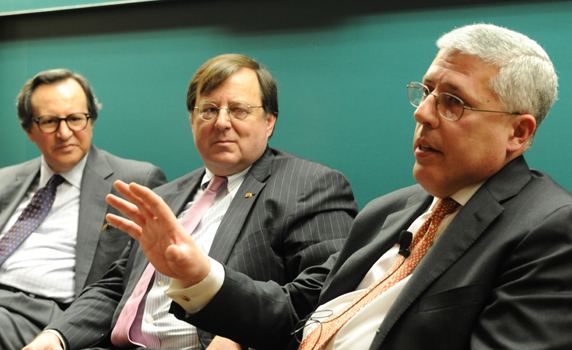
"If the US sneezes, the world catches a cold." These were the opening words of Eric Weber, chairing a debate between several members of IESE's US Advisory Council. They convened to present MBA students with their views on the US economy´s health: to what degree is it in recovery?
Tom Castro, President and CEO of El Dorado Capital and member of the board of Time Warner Cable, John Schmitz, Partner of Bingham Consulting LLC, and Juan Pujadas Global Leader of Advisory services for PwC, exchanged a mixture of converging and harmonious viewpoints on various topics. They centered on job creation in the States, new energy sources, US governmental bureaucracy and the education system.
The "dislocation" effect
For Joan Pujadas, Global Leader of Advisory services for PwC, the economic recession has left the US economy in a state of long term "dislocation." While it is in better shape today than in 2008, the degree of damage done then was so great that we should not be excessively excited about recent improvements.
Pujadas said that two economies will begin to emerge in the US. While some tiers of society were living so comfortably that they didn’t even need to worry about going to work, there sat a "vast trove of jobs which are unfulfilled." In sectors such as cloud computing and the media, there are not enough people with sufficient skills to fill the many jobs being created.
The US unemployment rate has fallen from 8 to 6 per cent. But let's not be fooled by the figures, Tom Castro added. Many people have given up even looking for work, and are sitting on the sofa living on benefits instead. So, in some sense, they don´t exist anymore.
John Schmitz, formerly an advisor to President Bush, insisted that energy is the "big story of recovery." The US and Europe are both serious about transforming the safety and environmental consequences of fracking.
In this regard, Tom Castro said that the controversial energy source, in which natural gas is extracted from shale rock layers deep within the earth, can be a positive geopolitical and economical force. He gave the example of recent events in Ukraine. If the US starts exporting cheap natural gas to Europe, this could undermine Russian president Vladimir Putin´s power.
The power of Government and education
All three members of IESE US Advisory Board agreed on the stifling effect of Washington's rules and regulations, as well as the Republican tendency to block initiatives that might regenerate the economy.
"We are experiencing recovery but it´s a divided one," said Pujadas. "There are many pillars that need to be put in place by the government."
His view was that the US fiscal cliff, the conundrum that the U.S. government faced at the end of 2012 when the terms of the Budget Control Act of 2011 were scheduled to go into effect, was an example of a situation in which talent was being stifled.
Further impeding recovery is the fact that the US "brand" is "troubled". Pujadas said that while Apple might be sailing along, at the same time there are many people choosing to buy almost any other brand just because it isn't American.
Education is at the heart of economic growth, all parties agreed. American parents need to change their lax approach to their children’s studies and arts subjects are over-promoted.